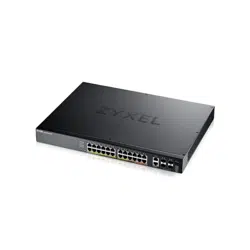Loading ...
Loading ...
Loading ...

Chapter 54 Spanning Tree Protocol
XGS2220 Series User’s Guide
396
Max Age This is the maximum time (in seconds) the Switch can wait without receiving a BPDU before
attempting to reconfigure. All Switch ports (except for designated ports) should receive BPDUs
at regular intervals. Any port that ages out STP information (provided in the last BPDU)
becomes the designated port for the attached LAN. If it is a root port, a new root port is
selected from among the Switch ports attached to the network. The allowed range is 6 to 40
seconds.
Forwarding Delay This is the maximum time (in seconds) the Switch will wait before changing states. This delay is
required because every switch must receive information about topology changes before it
starts to forward frames. In addition, each port needs time to listen for conflicting information
that would make it return to a blocking state; otherwise, temporary data loops might result.
The allowed range is 4 to 30 seconds.
As a general rule:
2 * (Forward Delay – 1) >= Max Age >= 2 * (Hello Time + 1)
SLOT This field appears only in Stacking mode. Click the drop-down list to choose the slot number of
the Switch in a stack.
Port This field displays the port number. In Stacking mode, the first number represents the slot ID and
the second is the port number. Please note that the default stacking ports (the last four ports
of your Switch) cannot be configured. They are reserved for stacking only.
* Settings in this row apply to all ports.
Use this row only if you want to make some settings the same for all ports. Use this row first to set
the common settings and then make adjustments on a port-by-port basis.
Note: Changes in this row are copied to all the ports as soon as you make them.
Active Select this check box to activate STP on this port.
Edge Select this check box to configure a port as an edge port when it is directly attached to a
computer. An edge port changes its initial STP port state from blocking state to forwarding
state immediately without going through listening and learning states right after the port is
configured as an edge port or when its link status changes.
Note: An edge port becomes a non-edge port as soon as it receives a Bridge
Protocol Data Unit (BPDU).
Root Guard Select this check box to enable root guard on this port in order to prevent the switch(es)
attached to the port from becoming the root bridge.
With root guard enabled, a port is blocked when the Switch receives a superior BPDU on it. The
Switch allows traffic to pass through this port again when the switch connected to the port
stops to send superior BPDUs.
Priority Configure the priority for each port here.
Priority decides which port should be disabled when more than one port forms a loop in a
switch. Ports with a higher priority numeric value are disabled first. The allowed range is
between 0 and 255 and the default value is 128.
Path Cost Path cost is the cost of transmitting a frame on to a LAN through that port. It is recommended
to assign this value according to the speed of the bridge. The slower the media, the higher the
cost.
Note: Set the value to 0 to use the auto path cost you set in the SWITCHING >
Spanning Tree Protocol > Spanning Tree Setup screen (see Auto Path-cost
Mode).
Tree Select which STP tree configuration this port should participate in.
Table 194 SWITCHING > Spanning Tree Protocol > MRSTP (continued)
LABEL DESCRIPTION
Loading ...
Loading ...
Loading ...
